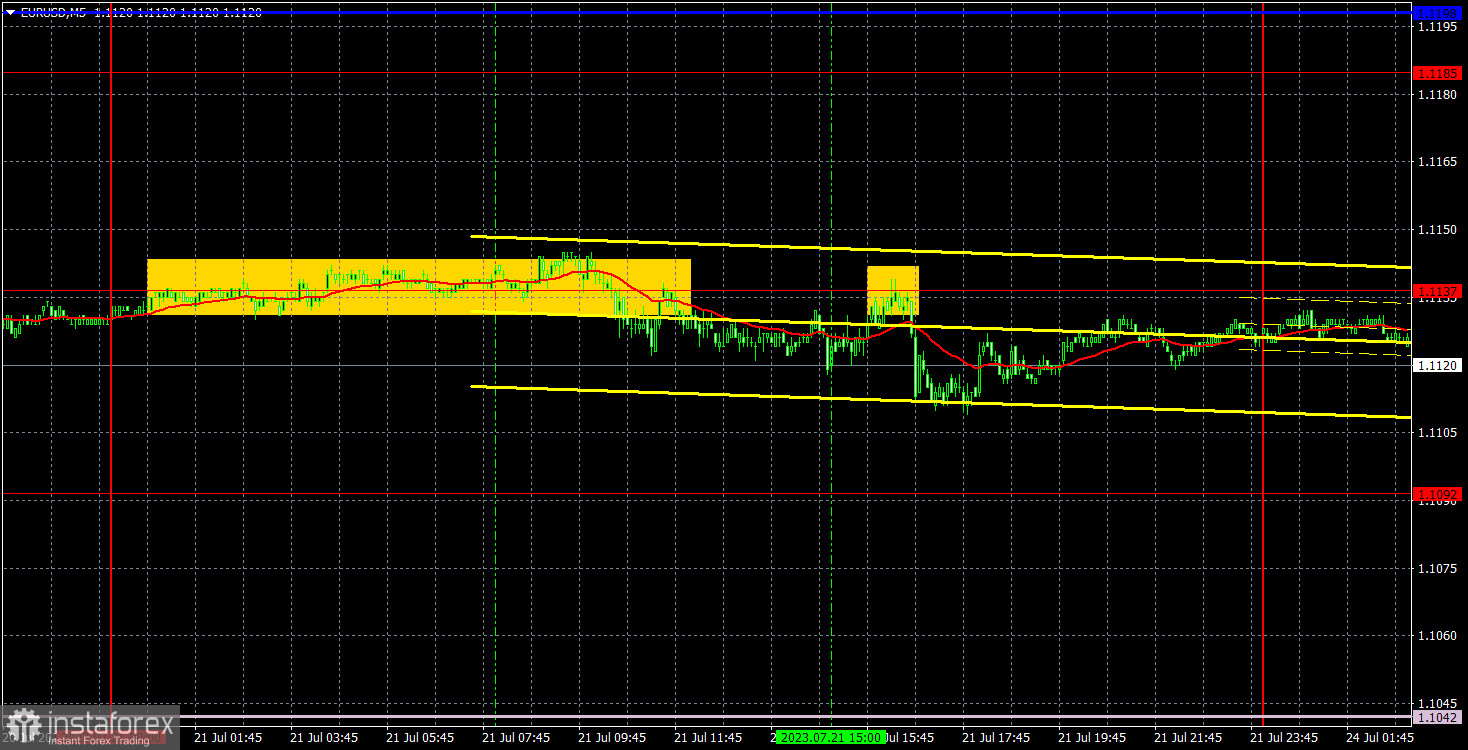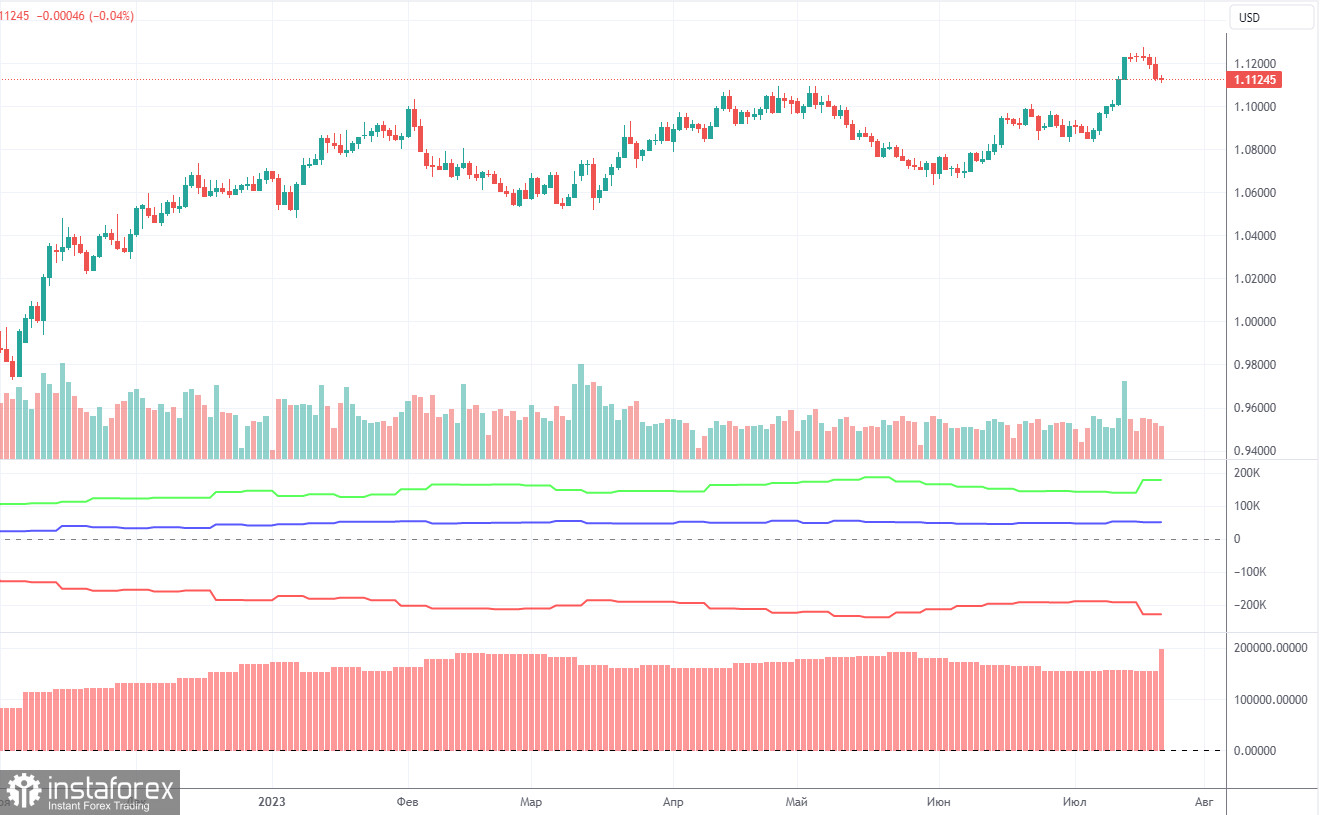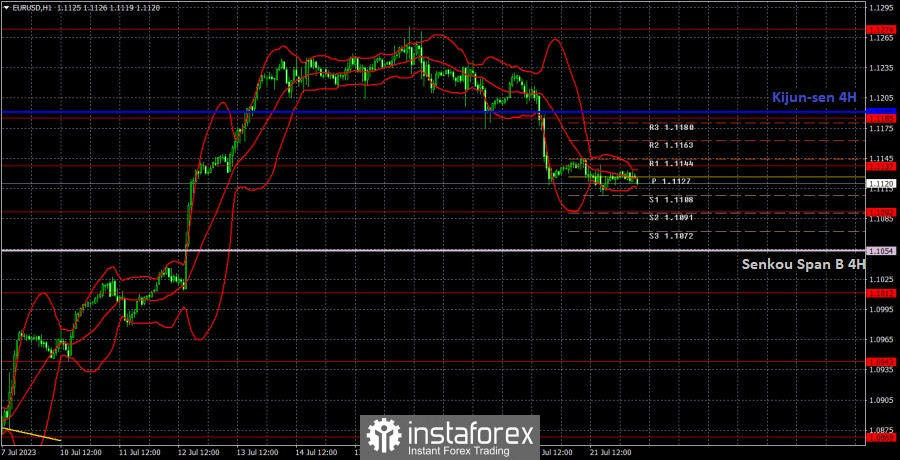Analysis of EUR/USD 5M

The EUR/USD pair's movements on Friday were quite dull. It was a low-volatility day with the price moving sideways within a range of less than 40 pips. This is in the absence of influential economic releases, making analysis quite uneventful. The downtrend persists on the 1H chart, but it could still be classified as a simple correction. The euro is hesitant to drop, perhaps waiting for the results of the European Central Bank and Federal Reserve meetings scheduled for this week. Although we already know the outcomes of these meetings, we still might hear interesting information from the heads of the central banks. We expect the pair to fall, but it may not be rapid or strong in the first half of the week.
Speaking of trading signals, there is also nothing significant to highlight about it. During the day, the price rebounded twice from the level of 1.1137, but it struggled to go down by just 15 pips in the second instance. As a result, traders were only able to open one short position, which did not yield any profit or loss.
COT report:

On Friday, a new COT report for July 18 was released. In the last 10 months, COT reports fully corresponded to what is happening in the market. The chart above clearly shows that the net position of major traders (the second indicator) began to grow in September 2022 and at about the same time the euro started climbing too. In the last 5-6 months, the net position has not risen but the euro remains at very high levels. At the moment, the net position of non-commercial traders is bullish. The euro keeps climbing against the US dollar.
I have already mentioned the fact that a fairly high value of the net position signals the end of an uptrend. This is also confirmed by the first indicator where the red and green lines are very far from each other. Usually, it precedes the end of the trend. During the last reporting week, the number of long positions of the non-commercial group of traders increased by 40,100 and the number of short ones by 1,500. The net position increased by 38,600 contracts. The number of long positions is higher than the number of short ones of non-commercial traders by 179,000. This is a very large gap as the difference is almost threefold. Even without COT reports, it is obvious that the euro should decline but speculators are still in no hurry to sell, and there are no signals for a reversal yet.
Analysis of EUR/USD 1H

On the 1H chart, the euro/dollar pair finally had room to correct and settled below the critical Kijun-sen line. Thus, the euro may descend to the Senkou Span B line in the coming days. We expect a much stronger decline from it and do not believe that fundamental support for the dollar is necessary for this.
On July 24, traders should pay attention to the following key levels: 1.0806, 1.0868, 1.0943, 1.1012, 1.1092, 1.1137, 1.1185, 1.1274, 1.1321, 1.1391, as well as the Senkou Span B line (1.1054) and Kijun-sen line (1.1191). The lines of the Ichimoku indicator can move during the day, which should be taken into account when determining trading signals. There are support and resistance levels that can be used to lock in profits. Traders look for signals at rebounds and breakouts. It is recommended to set the Stop Loss orders at the breakeven level when the price moves in the right direction by 15 pips. This will protect against possible losses if the signal turns out to be false.
Today, the European Union, Germany, and the United States, will release PMIs in the manufacturing and services sectors. Although these reports are considered as highly significant, there will be a total of 9 reports released, and only 1-2 of them may have an impact on the market. The market may respond moderately, but it is unlikely to change the overall market sentiment.
Description of the chart:
Support and resistance levels are thick red lines near which the trend may end. They do not provide trading signals;
The Kijun-sen and Senkou Span B lines are the lines of the Ichimoku indicator, plotted to the 1H timeframe from the 4H one. They provide trading signals;
Extreme levels are thin red lines from which the price bounced earlier. They provide trading signals;
Yellow lines are trend lines, trend channels, and any other technical patterns;
Indicator 1 on the COT charts is the net position size for each category of traders;
Indicator 2 on the COT charts is the net position size for the Non-commercial group.
 English
English 
 Русский
Русский Bahasa Indonesia
Bahasa Indonesia Bahasa Malay
Bahasa Malay ไทย
ไทย Español
Español Deutsch
Deutsch Български
Български Français
Français Tiếng Việt
Tiếng Việt 中文
中文 বাংলা
বাংলা हिन्दी
हिन्दी Čeština
Čeština Українська
Українська Română
Română

